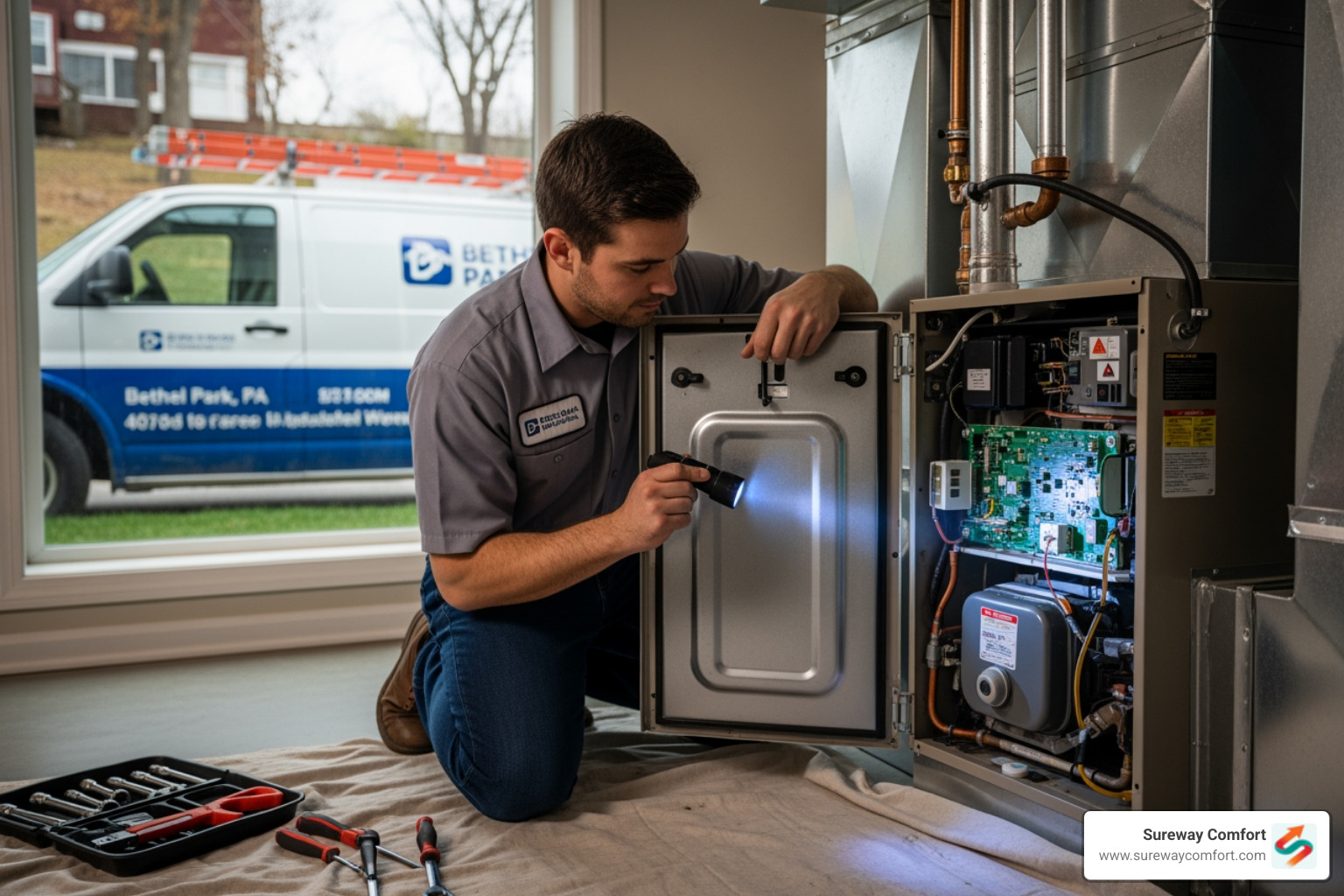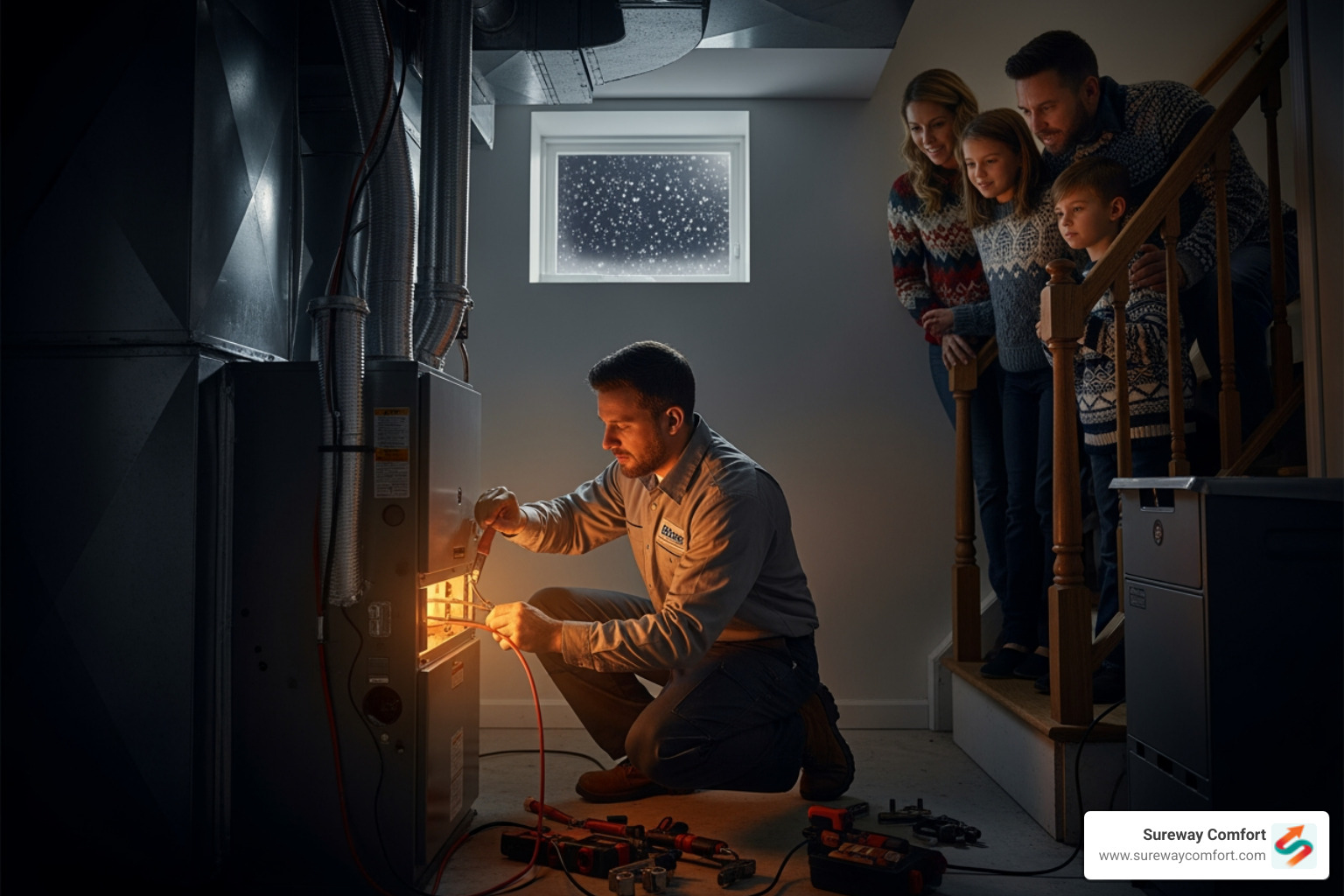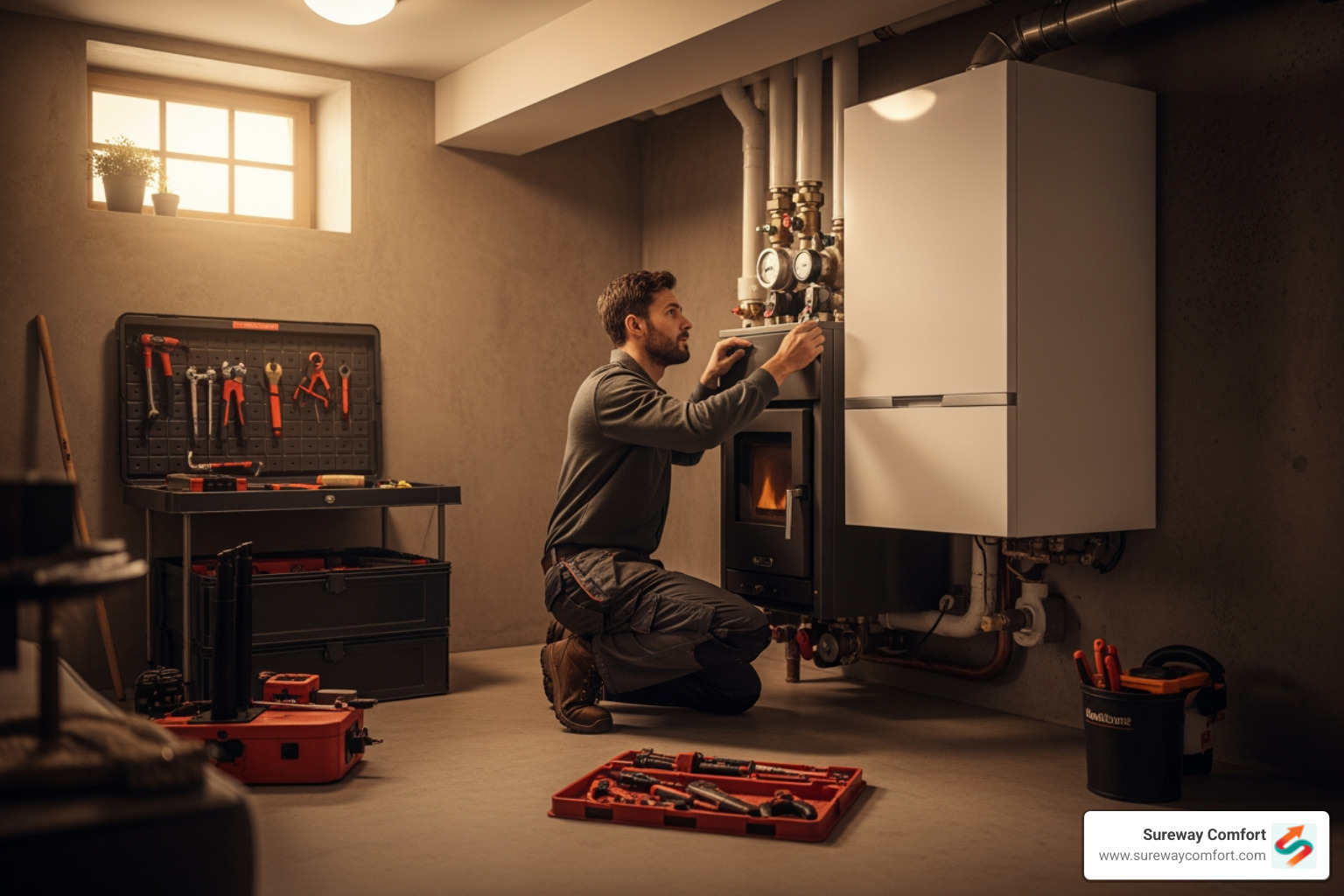Hearing a whistling sound from your AC can be confusing, especially when everything else seems to be working fine. But if you ignore it, that high-pitched sound could turn into a larger issue that affects comfort and performance inside your Mt. Lebanon home. Whether it comes and goes or stays persistent, a whistling AC usually means there is something off in your system that needs fixing.
In summer, when your cooling system works the hardest, issues like these tend to show up more often. Small air leaks or restricted airflow can quickly reduce your AC’s efficiency. If the airflow changes, your home might feel warmer and your energy bills could rise. Catching the cause early keeps your air conditioning running steadily through the peak of the heat.
Common Causes of Whistling Sounds in AC Units
There are several parts of your cooling system that can cause a whistling noise. Even if the cool air is still running, a whistle is a red flag that something could be holding the system back or allowing air to escape where it should not.
Here are the most common reasons your AC might be making that sound:
1. Clogged Air Filters
If your air filters are packed with dust or debris, airflow gets restricted. That change in air pressure may cause a whistling sound, especially as air tries to squeeze through the tight space. Replacing your filter regularly goes a long way in preventing this.
2. Leaky or Loose Ductwork
Air ducts help move cooled air throughout your house. If the ducts have come loose or there is a hole somewhere, air can escape with a high-pitched sound. Depending on the size of the leak, you might hear the whistle from vents or from a nearby wall.
3. Incorrectly Sized or Installed Equipment
If your system is too big or too small for your home, it may put off more air than the ducts can handle, or not enough. Either situation can produce noisy airflow or uneven pressure. That mismatch often leads to strange sounds during operation.
4. Blower or Fan Issues
Your AC’s blower motor pushes air around. If the blades are bent or loosened, they can make a whistling or whirring noise. Malfunctioning fans might also make it harder for air to move properly, creating irregular airflow patterns that sound off.
5. Refrigerant Restrictions or Leaks
Although not the most common cause, problems with refrigerant lines can sometimes create a faint whistle, especially near the evaporator coil or lines. These sounds usually come with other signs like reduced cooling or short cycling.
One homeowner in Mt. Lebanon described a soft whistling near their hallway vent that gradually got louder every week. The issue turned out to be a disconnected duct section inside their attic, pulling in warm air and making their system work extra hard to cool the house.
Whistling noises can happen on and off or just during certain stages of a cooling cycle. Listening carefully to when the sound starts, whether when the unit kicks on, runs heavily, or shuts off, can help narrow down what is causing it.
Signs That Your AC Needs Attention
A whistle coming from your AC unit is a strong warning, especially when paired with poor cooling or rising power use. While whistling on its own may already hint at airflow problems, combining it with one or more of the following signs often points to the need for immediate service.
Watch for these warning signs that something is not working right:
- The whistling starts getting louder or happens more often during the day or night
- Rooms feel warmer, or the temperature in the house is inconsistent
- You notice weaker airflow coming from most or all vents
- Utility bills are higher than usual for similar usage
- Water is building up near the AC unit, indicating drainage or coil troubles
- The unit is shutting off and on more frequently than normal, also known as short cycling
If multiple problems show up at once, such as poor airflow and moisture near vents, the risk of damaged components increases. Systems running under pressure or strain can develop more serious issues over time.
The longer a noise like a whistle goes unaddressed, the more likely it is that a duct is losing air or parts of the system are starting to wear out. Getting it checked by trained professionals as soon as possible helps protect your AC’s performance and your comfort through the rest of Mt. Lebanon’s summer.
Steps to Take When You Hear Whistling Sounds from Your AC
Once you hear a whistling sound coming from your AC unit, it is time to act. Air conditioning units are designed to run quietly. When something sounds off, it usually means air is moving where it should not or something is restricting its flow. Here are steps you can take to address it quickly and avoid long-term damage.
- Check the air filter: This is one of the easiest things a homeowner can inspect quickly. A dirty or blocked filter can restrict airflow and make the system work harder, which often causes whistling. If it is dirty or looks gray, it should be replaced right away.
- Look for duct leaks or gaps: Damaged or poorly connected ducts can allow air to escape. These air leaks often produce a whistling noise. Listen near the vents and along accessible duct runs in the basement or attic.
- Review the AC installation: If you have recently upgraded your system or made major changes to your home, it is possible the equipment is not the right size. An oversized unit might push too much air too fast. That pressure can whistle through supply vents or loose joints.
- Pay attention to the blower or fan: If the whistling changes with the fan speed, take note. Bent fan blades or a failing blower can produce air movement that creates a high-pitched sound. This often needs attention from our technicians to inspect or replace parts.
- Watch for refrigerant issues: If the whistling comes from the unit itself and not the vents, it might relate to pressure changes around the refrigerant lines. Sometimes a leak or partial blockage can cause strange sounds and other symptoms like reduced cooling.
These steps help narrow down the problem, but most issues tied to airflow or system balance need to be professionally inspected. AC units include multiple working parts, and issues like loose ducts or blower damage often sit out of reach for a homeowner. If the noise begins before or just after a change to your home’s cooling system, that timing can help our professionals figure out the cause faster.
Why AC Repairs Should Be Left to Trained Professionals
The deeper causes of a whistling AC often involve components that require special training to diagnose and repair. Taking apart ductwork or working around refrigerant lines is not something you want to attempt yourself, as even minor errors can create bigger issues over time.
Our technicians look at several core areas during an inspection. These include system pressure, airflow patterns, duct configuration, fan condition, and filter upkeep. When whistling is present, it usually relates to a change in pressure, air movement, or component wear.
Here is what our professionals can do during a service visit:
- Run a full airflow test to identify restrictors or leaks
- Examine ductwork sections in attics or crawlspaces that may be causing the noise
- Measure system pressure and confirm refrigerant levels are steady
- Check fan motors for bent or damaged blades
- Confirm filter condition and fit for the system’s size
By approaching whistling as a warning sign, rather than just noise, you can get ahead of more costly repairs. Left alone, a whistling AC might start short cycling, pull in unfiltered air, or end up damaging the motor due to overwork. These kinds of outcomes tend to show up later in the season, putting your comfort at risk during the most uncomfortable weeks.
Keeping Your AC Quiet and Effective in Mt. Lebanon
Strange AC noises in the summer heat are more than just loud. They are a sign that something is off inside your system. With whistling, the problem often ties back to air pressure shifts, restricted flow, or leaking connections. Quick action gives your system the best chance at long-term performance.
If you are living in Mt. Lebanon and hearing these sounds, it is best not to wait. Watching for patterns, taking note of when the noise happens, and identifying changes in airflow or temperature helps our technicians fix the problem faster. By staying on top of sounds like this, you can stop the issue from growing and keep your AC working smoothly through the season.
Annual checks and fast attention to strange noises give homeowners in Mt. Lebanon more control over their cooling systems. Preventative steps and professional help bring the peace of mind that hot days will not be disrupted by unexpected AC troubles. Most long-term cooling problems do not start with total failure. They start with small issues like a whistle.
If strange sounds persist from your AC in Mt. Lebanon, Sureway Heating Cooling Plumbing can help restore quiet, efficient cooling through our experienced professionals. Investing in AC repair in Mt. Lebanon ensures your system receives the proper care it needs to maintain consistent comfort. For a quick estimate or to book a service visit, please contact us today.




























.avif)



